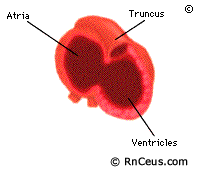 The most common heart defects include:
The most common heart defects include:Approximately 40 to 50% of infants with Down Syndrome will be diagnosed with a congenital heart defect. This is a common cause of death during the first two years of life (Mundakel & Purushottam, 2020). According to Colvin and Yeager (2017), heart and lung diseases including pneumonia, infectious lung disease, congenital heart defects, and circulatory diseases account for approximately 75% of deaths in persons with Down syndrome.
 The most common heart defects include:
The most common heart defects include:
About 30% of patients have more than one cardiac defect. Here are the most common secondary lesions:
For children with Down Syndrome who do not have structural heart disease at birth, 40-50% of them can develop valve abnormalities, such as mitral valve prolapse or aortic regurgitation, when they become adolescents or adults. (Mundakel & Purushottam, 2020).
All infants with Down syndrome should be evaluated by a pediatric cardiologist and have an echocardiogram during their first three months of life. In some cases, children with mild congenital disabilities are monitored regularly, and the defects resolve without surgery. Other children need intensive medical intervention in the form of diuretics, digitalis, and other cardiac medications. And about half the children with septal defects require open-heart surgery to repair the defect and prevent further cardiopulmonary problems.
See the RnCeus.com interactive course: Ventricular Septal Defect: Effects, Assessment & Treatment. for more in-depth information about ventricular septal defects and congenital heart disease.
Nurses caring for infants with Down syndrome should be aware of the early symptoms of heart disease in babies:
When working with children with valvular disease, it is essential to determine the physician's recommendations for prophylactic treatment for subacute bacterial endocarditis (SBE) and counsel the parents when indicated. SBE prophylaxis involves preventive antibiotic therapy before dental cleanings and other invasive procedures.
Nurses have an essential role in encouraging parents to follow health screening guidelines, teaching them to administer medications and other treatments as needed, and providing peri-operative care related to open-heart surgery.
Instant Feedback:
Vomiting and poor weight gain may be signs of early heart disease in babies with Down syndrome.
References
Mundakel, G.T. & Purushottam, L. (2020). Down Syndrome clinical presentation. Pediatrics; Genetics and Metabolic Disease. https://emedicine.medscape.com/article/943216-clinical#b2
Colvin, K.L. & Yeager, M.E. (2017). What people with Down Syndrome can teach us about cardiopulmonary disease. Eur Respir Rev. 26 (143).